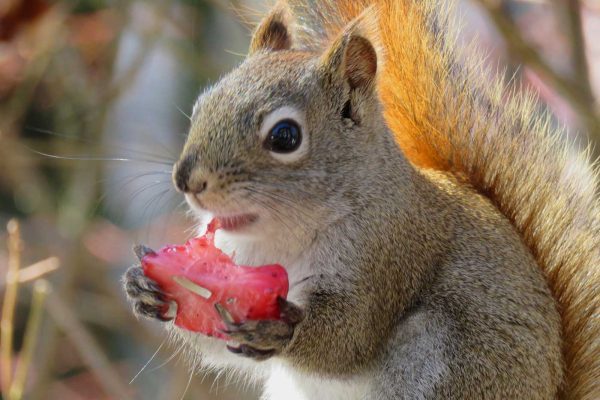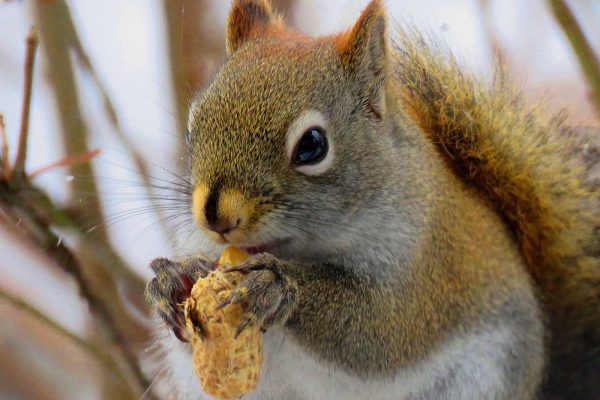I love chatting with Don Cote at the Duck Pond Wildlife Rehab Center – he has more than 50 years of critter stories to share! Not all have happily-ever-after endings, but I think every one of the animals Don and his late wife Carleen cared for over the decades touched his heart. It’s comforting to me to know that those who didn’t survive were tended to by folks who did their best to keep them safe and comfortable in their final days or hours.

Photo by Jayne Winters
When I dropped by Don’s house the other day, I had to first check in on Little Red who was the victim of a glue trap a couple months ago. I’m happy to report that he’s doing well, very active, and soon to be put into a larger cage for more space to get exercise. His tail still looks funky, like a poodle’s tuft on the end, but the fur is getting longer and even the hairless part is starting to show signs of new fuzz.
Don and I started talking about squirrel food preferences: unsalted peanuts in the shell, sunflower seeds, mixed bird seed, and fruits. He mentioned Little Red loves the peanuts I’ve brought, but the gray, not so much, which I found odd as the grays I feed at home make short work of peanuts, in the shell or out. One “tidbit” of information Don shared is that a diet of just nuts or sunflower seeds is bad for squirrels. Even though we see them stealing seeds from our bird feeders, their diet in the wild is varied: bark, pine cones, fungi (like mushrooms), fruits, berries, nuts, flowers, buds, and even insects, eggs, and small birds (I remember years ago, I was shocked and disgusted to see a gray squirrel eating a dead chickadee that had hit a window on our deck). A proper calcium to phosphorous ratio is important, especially in mammals. Sunflower seeds and other nuts have plenty of phosphorous, but little, if any, calcium. Calcium is important for all kinds of body functions, like blood circulation and respiration, as well as bone strength. Without a calcium-rich diet, squirrels can become weak or paralyzed and can suffer from seizures. Sunflower seeds and other nuts should make up only about 5% of a squirrel’s diet!
I found some interesting info online about what to include (or not) in a squirrel diet: almonds should be given sparingly (they contain a chemical also found in aspirin, which is stored in the body and takes up to three weeks to disappear); pumpkin seeds should only be given now and then (they’re high in phosphorous and make squirrels — and people! — nervous). Do NOT feed Portabello or white button mushrooms because they contain three carcinogens; do NOT put out a whole ear of corn as it sours and molds quickly; and do NOT feed apple slices with seeds in the core (they contain cyanide and are toxic).

Photo by Jayne Winters
Grapes should be cut in half and other fruit into small pieces; grape skins should be removed if feeding baby squirrels so they don’t choke. Grapes and other fruits are naturally sweet. While they provide energy, frequent consumption can lead to weight gain and dental problems, much like in humans. Tooth decay can be a serious problem in squirrels as healthy teeth are needed for foraging. Fruits should always be washed (avoid soaps or detergents) to clean them of pesticides and other chemicals. Fruits with pits or seeds can pose a choking hazard and may contain compounds that can be harmful if eaten in large quantities. Just as with our own diet, diversifying foods ensures a range of nutrients to provide overall good health. It’s always best to do thorough research or consult with wildlife experts before introducing any new food to squirrels.
Don and his volunteers greatly appreciate other rehabbers who continue to generously provide assistance to help keep critter care at Duck Pond manageable. Please check the following websites to see if there is one near you: www.mainevetmed.org/wildlife-rehabilitation or www.maine.gov/ifw/fish-wildlife/wildlife/living-with-wildlife/orphaned-injured-wildlife/index.html
Donald Cote operates Duck Pond Wildlife Care Center on Rte. 3 in Vassalboro. It is a nonprofit, State-permitted rehab facility, which is supported by his own resources and outside donations. Mailing address: 1787 North Belfast Avenue, Vassalboro ME 04989 Phone: (207) 445-4326. Please note that the prior wildlifecarecenter email address is no longer monitored.
—by Jayne Winters, Natural Resources Council of Maine member from South China, Maine
Critter Chatter also appears monthly in the Town Line newspaper.
Banner photo: Red squirrel eating sunflower seeds in Winthrop, by Beth Comeau









Leave a Reply